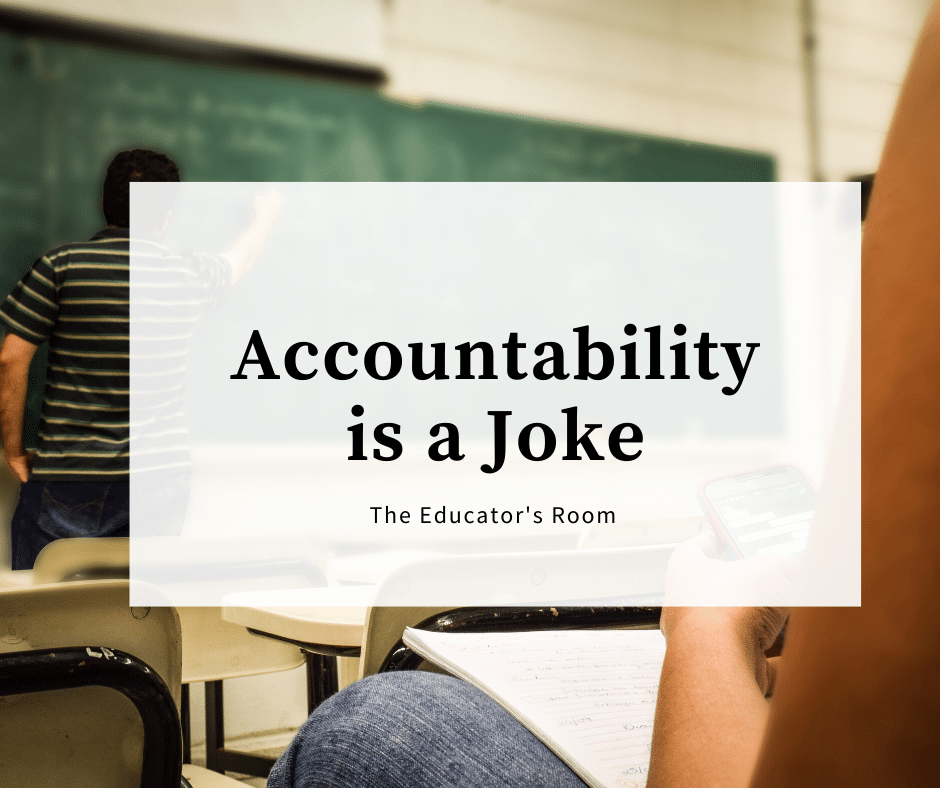Guest Writer: Adam Sutton
Accountability has been a required buzz word when talking about school reform for 20 years. It ties results to school spending. In particular, test scores and student achievement data are expected to rise with spending. Accountability’s current usage is useless and divisive.
Accountability, as it stands, is a way to lay blame when schools don’t boost test scores enough. It gives politicians and reformers a target to launch their criticisms at. It turns communities against each other, entrenches “these schools” and “those schools,” all while demoralizing teachers, and preventing any real school reforms from taking shape. Mainly, accountability is an exercise in semantics.
This is not to say that we shouldn’t expect results from our schools. But, after 20 years of relying on test scores as our benchmark, we need a different view of accountability. We trick ourselves into thinking that test scores simplify conversations about schools. In reality, focusing on test scores overlooks questions like: What resources do teachers and students need? Or, how do we meet student’s needs? Or, even, what does a student need? By focusing on school accountability and performance around test scores, we skip the process of educating kids.
We need to shift from accountability linked to results to the accountability of actions. We should parse accountability in terms of what teachers and schools will do to help students. This will force us to think about what better teaching is and the resources needed to achieve it.
We already do this with students who receive special education services. A student may be required to have an hour of individualized physical, occupational or speech therapy each week. These services are essential for that student’s success. Similarly, for students operating two or three grade levels behind their peers, we need to think about the services they need to catch up, not just the test score they must achieve.
Consider this in a different light. When people go to physical therapy following an injury, they are behind. The therapist might think about the types of activities they want the patient to perform in six weeks, but they design treatment that builds to that culmination. There is a specific amount of time dedicated to treatment both at home and in the clinic. Exercises become more robust as the patient heals and improves. Eventually, the patient returns to full activity. They have caught up and closed the gap, but only because they have worked through a series of steps.
That’s not what we do in public education. We hold people accountable to the final product, the test score. We do it this way because if we start to delineate definite amounts of time as well as specific services students will need, we will run into two problems. First, we are going to realize the time needed to provide students with the requisite number of services will not fit into the school day. Second, the number of students requiring services is going to outpace the number of service providers school systems employ. How many individuals does a physical therapist see on a given day? I don’t have a clue, but it’s a lot less than the 100+ students a general educator sees daily. Helping people is both time-consuming and expensive.
[bctt tweet=”Teachers and school-based staff need to take back the narrative of how schools run” username=””]
Teachers and school-based staff need to take back the narrative of how schools run. They need to start articulating loudly and clearly what services kids need if they are going to catch up. This conversation can’t be limited to smaller class sizes. It has to involve discussions about intensive pullout sessions and enrichment classes. Simply shrinking the size of the class isn’t going to work for many students who are years behind; they need more time. Railing against the lack of discipline and crying out for more suspensions won’t work either. If the goal is to help kids, we have to talk about what we are going to do when they mess up. How will we teach them as whole people? Policymakers and bureaucrats are too far removed from schoolhouses to understand or appreciate the nuance of these needs. It has to be driven by teachers in classrooms, aides assisting students, and administrators walking the halls of our schools who can create true plans for accountability. These are the people who know the actions that need taking if we are going to improve public education.
Education is a process, not a destination. The sooner we start holding our schools accountable for providing a robust journey, the sooner our schools will become healthy, welcoming places people want to inhabit.





